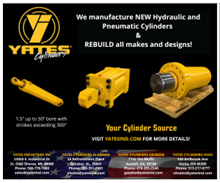European Parliament Urges EU to Step Up Efforts to Help Steel Industry Out of Crisis
12/18/2014 - The EU should step up its efforts to help the steel industry out of the crisis, Members of the European Parliament (MEPs) said in a non-binding resolution voted on 17 December 2014.
They asked the European Commission to ensure that trade deals improve steel export conditions and check that EU competition and state aid rules do not lead to unfairness between EU countries. MEPs also called for investments in workers' education and training as well as in steel research.
MEPs asked the Commission to provide precise information on the European and global steel demand/supply balance and major social, economic and environmental challenges in order to develop medium- and long-term initiatives to support the steel industry in Europe.
Health-check on current EU rules
Parliament asks the Commission to check whether the application of EU competition rules or state aid rules has caused unfair distortion in the European steel market and, if so, to present corrective measures. It also calls for measures to prevent global steelmakers from playing EU member states off against each other over announcements of restructuring plans, MEPs say.
Tailor trade deals to boost export opportunities
MEPs want future trade agreements to include provisions which significantly improve export opportunities and market access for European steel and steel-based products. They stress that fair trade in steel products can work only if basic employment rights and environmental standards are respected and call for a modernisation of the EU´s trade defence instruments.
Trade with carbon emitting rights
MEPs ask the Commission to examine the feasibility of a “border carbon adjustment” (Emissions Trading Scheme charges on EU steel imports) to create a level playing field in terms of CO2 emissions andpropose that income that firms earn from selling their free ETS allowances should be entirely reinvested in the low-carbon economy (equipment, technologies, R&D, and workforce training).
Invest in steel projects, training and research
Parliament urges the Commission to consider dedicating part of its Investment Package to long-term infrastructure projects and innovation for large-scale industrial projects. MEPs also suggest that the European Investment Bank and the European Bank for Reconstruction and Development as well as several EU programmes could be used to invest in steel projects, training and research.
The resolution was adopted by 466 votes to 133, with 100 abstentions.
Background
Since 2007, the European steel industry has shed 60,000 jobs due to plant closures and its output has declined by a fifth. Falling demand and increased global competition are two key causes. The steel industry today employs more than 350,000 people directly and millions of people in related industries, including recycling.
MEPs asked the Commission to provide precise information on the European and global steel demand/supply balance and major social, economic and environmental challenges in order to develop medium- and long-term initiatives to support the steel industry in Europe.
Health-check on current EU rules
Parliament asks the Commission to check whether the application of EU competition rules or state aid rules has caused unfair distortion in the European steel market and, if so, to present corrective measures. It also calls for measures to prevent global steelmakers from playing EU member states off against each other over announcements of restructuring plans, MEPs say.
Tailor trade deals to boost export opportunities
MEPs want future trade agreements to include provisions which significantly improve export opportunities and market access for European steel and steel-based products. They stress that fair trade in steel products can work only if basic employment rights and environmental standards are respected and call for a modernisation of the EU´s trade defence instruments.
Trade with carbon emitting rights
MEPs ask the Commission to examine the feasibility of a “border carbon adjustment” (Emissions Trading Scheme charges on EU steel imports) to create a level playing field in terms of CO2 emissions andpropose that income that firms earn from selling their free ETS allowances should be entirely reinvested in the low-carbon economy (equipment, technologies, R&D, and workforce training).
Invest in steel projects, training and research
Parliament urges the Commission to consider dedicating part of its Investment Package to long-term infrastructure projects and innovation for large-scale industrial projects. MEPs also suggest that the European Investment Bank and the European Bank for Reconstruction and Development as well as several EU programmes could be used to invest in steel projects, training and research.
The resolution was adopted by 466 votes to 133, with 100 abstentions.
Background
Since 2007, the European steel industry has shed 60,000 jobs due to plant closures and its output has declined by a fifth. Falling demand and increased global competition are two key causes. The steel industry today employs more than 350,000 people directly and millions of people in related industries, including recycling.



.jpg?lang=en-US&ext=.jpg)
.gif?width=220&height=200&mediaprotectionhash=374c6b9a31f2b2fbfc7937391034efb46fd57feba997b9ad2ae9a0bd3d48329d&ext=.gif)

.gif?width=100&height=200&mediaprotectionhash=e2d5b15d68f84f22038524be6c58e5268d67b7f44494b544e29a8d53c5b959ba&ext=.gif)
